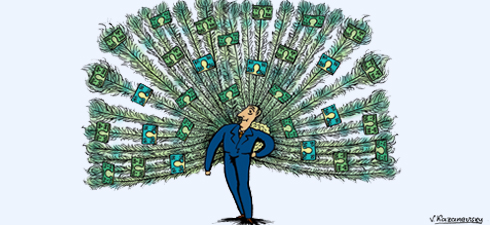What is our contribution, and what do we get back in the form of agricultural subsidies and gifts for poorer regions like Flevoland? This should be a straightforward cost-benefit analysis. The Netherlands has been one of the biggest net contributors to Europe for years. Over two hundred euros per Dutch citizen per year, in total 3.6 billion euros, but less than, for example, Sweden or Germany.
The question is, however, whether the benefits are only those few billion in subsidies from Brussels. In fact, according to studies, the Netherlands has benefited so much from Europe that the net contribution is insignificant. Hans Vollaard, lecturer in political science in Leiden: “You have to see the contribution as a kind of fee for the free market.”
Higher benefits
And these proceeds were fairly accurately calculated in 2011 by the Netherlands Bureau for Economic Policy Analysis: on average the free internal market provides the Dutch with a month's salary per year, and the euro with a maximum of a week's salary. Far more, in other words, than the net contribution. How is this possible?
Professor of banking and finance Harald Benink: “We earn two-thirds of our national income with exports. Three-quarters of this goes to Europe. The free market is extremely important.” It is difficult to estimate how much trade would take place without the internal market, but Benink does not think the results are exaggerated.
Most other studies show much higher benefits. Nico Groenendijk, professor in European economic policy emphasises, in addition, that the issue goes beyond the measurable advantages; the benefit of safety and stability is incalculable.
Nevertheless, some question marks can be placed next to this “benefit”. The Netherlands as a whole may benefit, the same cannot be said for every individual Dutch citizen. Think of construction workers who lose their job to Polish plasterers.
A better deal for richer countries
The question euro-critics ask still remains — why should the Netherlands have to pay a higher contribution for access to the internal market than other countries? The answer is often that this is a matter of solidarity, helping to pay for the development of poorer regions. But in reality the internal market is often a better deal for richer countries than for poorer ones.
Josef Janning, director of studies at the European Policy Centre: “A country like Germany benefits more: it can export extensively, whereas otherwise it would have been restrained by national borders and anti-German sentiment. The most developed countries can push local products in less developed countries off the market. This also applies to Dutch exports.” To put it differently: we may be a net contributor, in many respects we are also net earners.
Was this article useful? If so we are delighted!
It is freely available because we believe that the right to free and independent information is essential for democracy. But this right is not guaranteed forever, and independence comes at a cost. We need your support in order to continue publishing independent, multilingual news for all Europeans.
Discover our subscription offers and their exclusive benefits and become a member of our community now!












